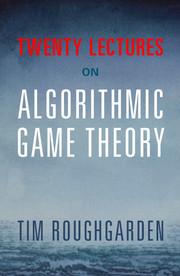Book contents
- Frontmatter
- Dedication
- Contents
- Preface
- 1 Introduction and Examples
- 2 Mechanism Design Basics
- 3 Myerson's Lemma
- 4 Algorithmic Mechanism Design
- 5 Revenue-Maximizing Auctions
- 6 Simple Near-Optimal Auctions
- 7 Multi-Parameter Mechanism Design
- 8 Spectrum Auctions 97
- 9 Mechanism Design with Payment Constraints 113
- 10 Kidney Exchange and Stable Matching
- 11 Selfish Routing and the Price of Anarchy
- 12 Over-Provisioning and Atomic Selfish Routing
- 13 Equilibria: Definitions, Examples, and Existence
- 14 Robust Price-of-Anarchy Bounds in Smooth Games
- 15 Best-Case and Strong Nash Equilibria
- 16 Best-Response Dynamics
- 17 No-Regret Dynamics
- 18 Swap Regret and the Minimax Theorem
- 19 Pure Nash Equilibria and PLS-Completeness
- 20 Mixed Nash Equilibria and PPAD-Completeness
- The Top 10 List
- Hints to Selected Exercises and Problems
- Bibliography
- Index
15 - Best-Case and Strong Nash Equilibria
Published online by Cambridge University Press: 05 August 2016
- Frontmatter
- Dedication
- Contents
- Preface
- 1 Introduction and Examples
- 2 Mechanism Design Basics
- 3 Myerson's Lemma
- 4 Algorithmic Mechanism Design
- 5 Revenue-Maximizing Auctions
- 6 Simple Near-Optimal Auctions
- 7 Multi-Parameter Mechanism Design
- 8 Spectrum Auctions 97
- 9 Mechanism Design with Payment Constraints 113
- 10 Kidney Exchange and Stable Matching
- 11 Selfish Routing and the Price of Anarchy
- 12 Over-Provisioning and Atomic Selfish Routing
- 13 Equilibria: Definitions, Examples, and Existence
- 14 Robust Price-of-Anarchy Bounds in Smooth Games
- 15 Best-Case and Strong Nash Equilibria
- 16 Best-Response Dynamics
- 17 No-Regret Dynamics
- 18 Swap Regret and the Minimax Theorem
- 19 Pure Nash Equilibria and PLS-Completeness
- 20 Mixed Nash Equilibria and PPAD-Completeness
- The Top 10 List
- Hints to Selected Exercises and Problems
- Bibliography
- Index
Summary
This lecture has two purposes. The first is to introduce a simple model of network formation that resembles atomic selfish routing games but has positive externalities, meaning that an agent prefers to share the edges of her path with as many other agents as possible. Such games generally have multiple PNE with wildly varying costs. The second purpose of the lecture is to explain two approaches for confining attention to a subset of “reasonable” PNE. Ideally, better worst-case approximation bounds should hold for such a subset than for all PNE, and there should also be a plausible narrative as to why PNE in the subset are more worthy of study than the others.
Section 15.1 defines network cost-sharing games and considers two important examples. Section 15.2 proves an approximation bound for the best-case PNE of a network cost-sharing game. Sections 15.3 and 15.4 prove a bound on the POA of strong Nash equilibria, the subset of PNE for which no coalition of agents has a beneficial deviation.
Network Cost-Sharing Games
Externalities
The network formation model introduced next is a concrete example of a game with positive externalities. The externality caused by an agent in a game is the difference between her individual objective function value and her contribution to the social objective function value. The models studied in previous lectures have negative externalities, meaning that agents do not fully account for the harm that they cause. In a routing game, for example, an agent does not take into account the additional cost her presence creates for the other agents using the edges in her path.
There are also important applications that exhibit positive externalities. You usually join a campus organization or a social network to derive personal benefit from it, but your presence also enriches the experience of other people in the same group. As an agent, you're generally bummed to see new agents show up in a game with negative externalities, and excited for the windfalls of new agents in a game with positive externalities.
- Type
- Chapter
- Information
- Twenty Lectures on Algorithmic Game Theory , pp. 202 - 215Publisher: Cambridge University PressPrint publication year: 2016



